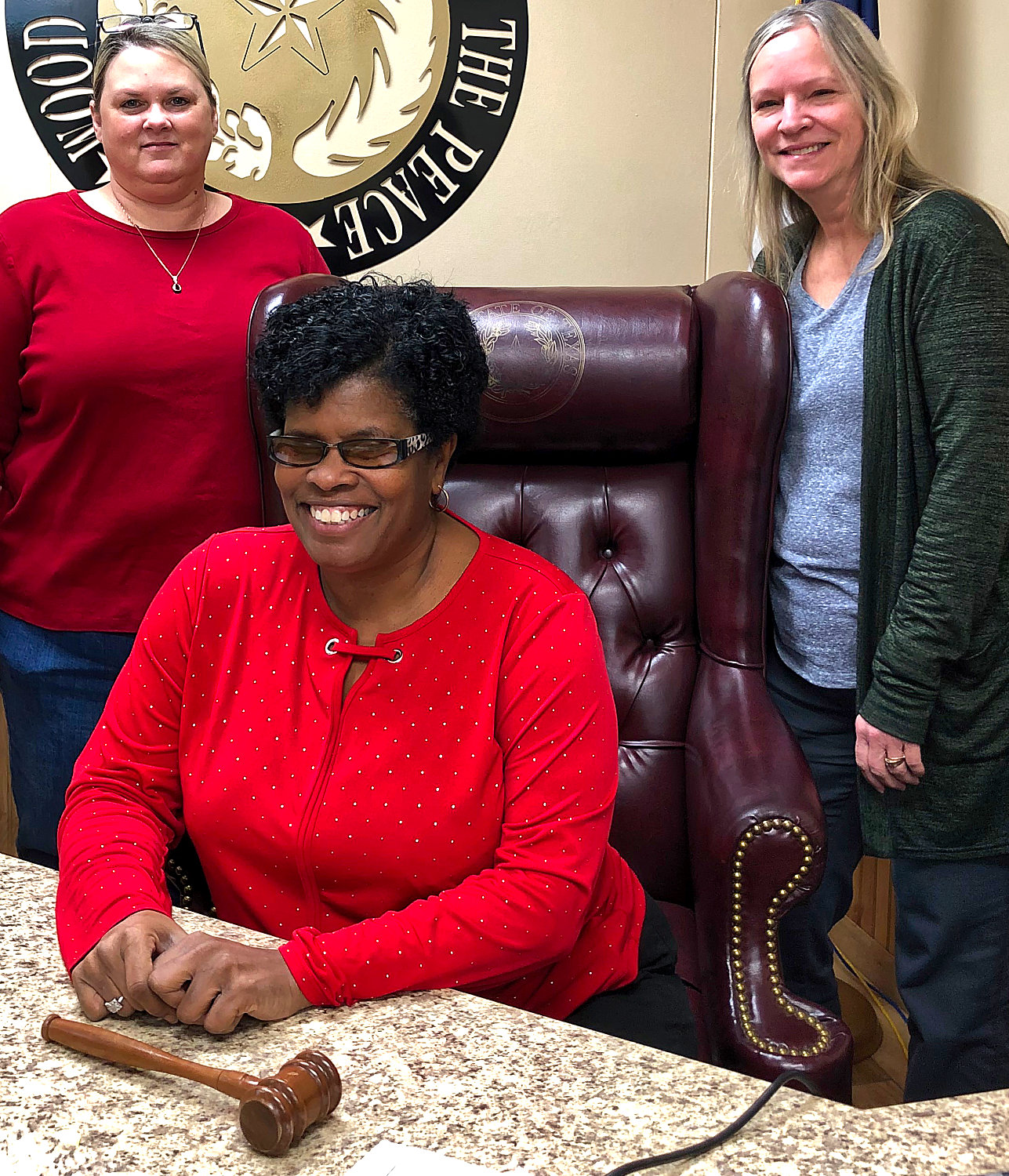JP changing perceptions with community outreach
news@wood.cm
Since taking office as Wood County Precinct Two justice of the peace in January 2019, Judge Janae Holland and her staff, Monica Bailey and Anita Piper, have made many changes to how their office relates to and is involved with the public.
This item is available in full to subscribers.
Attention subscribers
To continue reading, you will need to either log in to your subscriber account, or purchase a new subscription.
If you are a current print subscriber, you can set up a free website account and connect your subscription to it by clicking here.
If you are a digital subscriber with an active, online-only subscription then you already have an account here. Just reset your password if you've not yet logged in to your account on this new site.
Otherwise, click here to view your options for subscribing.
Please log in to continue |
JP changing perceptions with community outreach
Since taking office as Wood County Precinct Two justice of the peace in January 2019, Judge Janae Holland and her staff, Monica Bailey and Anita Piper, have made many changes to how their office relates to and is involved with the public.
In an effort to foster goodwill and change the perception of law enforcement and the judicial system being seen as the “bad guys,” Holland and her staff are becoming more connected to the community.
They are now members of the Mineola Chamber of Commerce and several other civic organizations. They regularly make visits to the area schools to check on students, and they also allow children to visit and take pictures in the courtroom. Holland noted that she wants children to feel comfortable and know they can come to her with their problems.
Holland volunteers at several local food banks in addition to having a food bank and clothing pantry at the sub-courthouse. She has also begun keeping books in her office to loan to children who have none.
“A lot of poor kids don’t feel comfortable in a library setting,” observes Holland. After talking to a seven-year-old boy about his anger and destructive behavior, Holland suggested ways for him to positively deal with his feelings, such as reading a book. When he said he didn’t have any, she made it her mission to get him some. Now, he and any other child can borrow books from her and trade them out for new ones when they’re ready.
“You have to meet people where they are,” affirms Holland, and that is exactly what she and her staff are doing. Holland can often be found in the lobby of the building, visiting and bringing drinks to people who are there for court. She says sometimes they don’t even know she’s the judge.
“I don’t want people to think that I’m ever looking down on them,” explained Holland. Her philosophy of equality is also why you’ll often see her sitting at the table rather than at her bench.
Holland knows that many people who come into her court are struggling with poverty also.
As Aristotle stated, “Poverty is the parent of crime” and Holland is determined to break that relationship in Wood County Precinct Two by making it easier for those who are doing their best to survive live on the right side of the law.
Holland, Bailey and Piper have taken several classes on poverty to help them understand the struggle and will be attending another seminar this month featuring Dr. Ruby Payne, author of “Bridges Out of Poverty.”
Holland is partnering with Wood County Juvenile Probation and Melanie Whitehurst to stop the cycle of poverty and crime, which often go hand-in-hand, in the younger generation. According to the Bureau of Justice Statistics, people living in poverty have a higher rate of violence and more than double the rate of violent victimization.
Along with Logan Belcher, owner of Logan’s Restaurant, Holland is taking recipes and boxes from the food pantry to Wood County Juvenile Probation to teach children how to make meals from basic ingredients. The hope is that when children know how to get their basic needs met, they can concentrate more on their education and taking steps out of poverty.
Upon taking office, one of the first things that Holland implemented was accepting credit or debit card payments and offering payment plans with some being as low as $25 a month. For many people, when faced with fines that are much more than they can afford, they feel overwhelmed. They become crippled in criminal debt as more fines are stacked upon fines they couldn’t pay to begin with.
As Holland acknowledges, “This only perpetuates the cycle. By giving them opportunities to help themselves, they get a hand up in life and a feeling of accomplishment.”
Holland says she looks at the client’s finances first to see if they can afford the fines. If they qualify, they can sometimes get community service instead.
Additionally, Holland has recently implemented Saturday court for those who can not make it to court during the work week. From 8-10 a.m., on one Saturday every three months, Judge Holland and her staff are at the sub-courthouse to accept pleas and work with clients.
“Even if it’s one Saturday every three months, it may keep someone from having to miss work. Their case can get pushed out a little further. We want to make it work for the public,” maintained Holland. Usually in less than 10-15 minutes, clients can come in, be heard, and get their case taken care of, says Bailey.
Holland, Bailey and Piper have continued to stay busy with a case load that has increased by 49% from the previous year.
In the past year, Holland has been the magistrate for 191 cases of inmates at the jail. They have had 935 traffic cases, 106 debt claim cases, 95 non-traffic cases, 44 landlord tenant cases, 35 inquests, 12 hot check cases, 11 small claims cases and one juvenile case.






